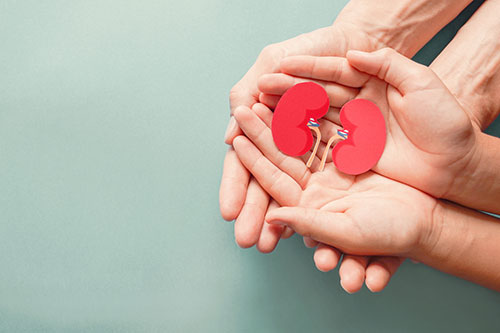Blood Group Incompatible Renal Transplant in COVID Antibody Positive Patient
Kidney transplantation involves transplanting a live organ in a patient with end stage kidney failure. Everyone has an immune system that identifies any foreign protein – be it a bacterial, viral or renal tissue from a donor – and tends to reject it. The immune system cannot differentiate between life-threatening bacteria and a lifesaving transplanted organ.

Towards preventing organ rejection, the recipient has to take immuno-suppressive medications that slow down the immune response to the foreign organ. This has a price to pay as this suppression is not selective to the transplanted organ. Therefore, during this time, if bacteria, virus or any other infective organism enter the body, the immune system cannot fight it out. This predisposes the recipient to the risk of acquiring life-threatening infections.
Organ transplant is like walking on a tight rope. On the one hand, it involves saving the transplanted organ by immuno-suppression and on the other hand,it should not suppress the immune system to a great extent that the recipient faces the risk of infections. Balancing the degree of immuno-suppression that saves the transplanted organ without losing the power to fight against infections is key.
Kidney transplantation during COVID times took a big hit as the pandemic increased the risk of COVID-19 infection during the post-transplant period. The light at the end of the tunnel is that those who have recovered from COVID infection or those who are vaccinated and have protective antibodies are immune to infection, and hence can be considered for organ transplantation.
Blood group incompatible transplantation involves transplanting an organ across blood groups. All of us have one of the 4 blood groups depending on the type of blood group protein – A, B, AB & O. Of these, O blood group is a universal donor and an AB group individual is a universal recipient. Transplanting an A blood group individual’s organ to a B blood group recipient has the risk of rejection immediately after transplantation. This is because the antibodies against the opposite blood group is present in all of us from the time of birth itself; also, these blood group proteins are present not only in the blood cells but also in other cells including those of the kidneys.
Blood group incompatible organ transplant involves removing the blood group antibodies by plasmapheresis – a technique wherein the blood is removed of these anti blood group antibodies, and the immune system is suppressed to a higher extent so that the antibody production subsequently is minimized. This process has made blood group incompatible organ transplant highly successful. But the flip side is that this process removes the antibodies against COVID infection too, thereby increasing the risk of COVID infection.
Mr. TS, a 30-year-old gentleman with end-stage kidney failure had only his mother-in-law available as his renal donor. His blood group was A and his donor had a blood group of B. The initial evaluation revealed that the level of pre-transplant blood group antibody levels was within the transplantable range (1:256 dilutions) and other tests were normal. The patient went through the treatment as per the protocol and the antibody titres came down to 1:2 which is ideal for organ transplantation.
He had a smooth intra and post-transplantation period, his kidney functions remained normal and the antibodies measured against the blood group antigen remained at the pre transplant level. The COVID antibodies tested too remained positive, in spite of high-level immuno-suppression. The donor too had a safe intra and post-operative period.
This is one of the few transplants that have been performed in our country. Blood group incompatible renal transplantation in a COVID vaccinated patient can be performed with adequate planning and close monitoring even during COVID times.
This is a great team effort. Apart from the nephrologists – the transplant surgeons, the anaesthesiologists, operation theatre staff, post-transplant nurses, lab support and other administrative backup are key to this success.

Dr. R.Balasubramaniyam
Chief of Nephrology
Kauvery Hospital, Chennai

Dr. Balaji Kirushnan
Associate Consultant Nephrologist
Kauvery Hospital, Chennai

